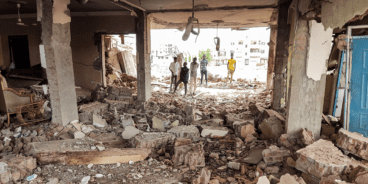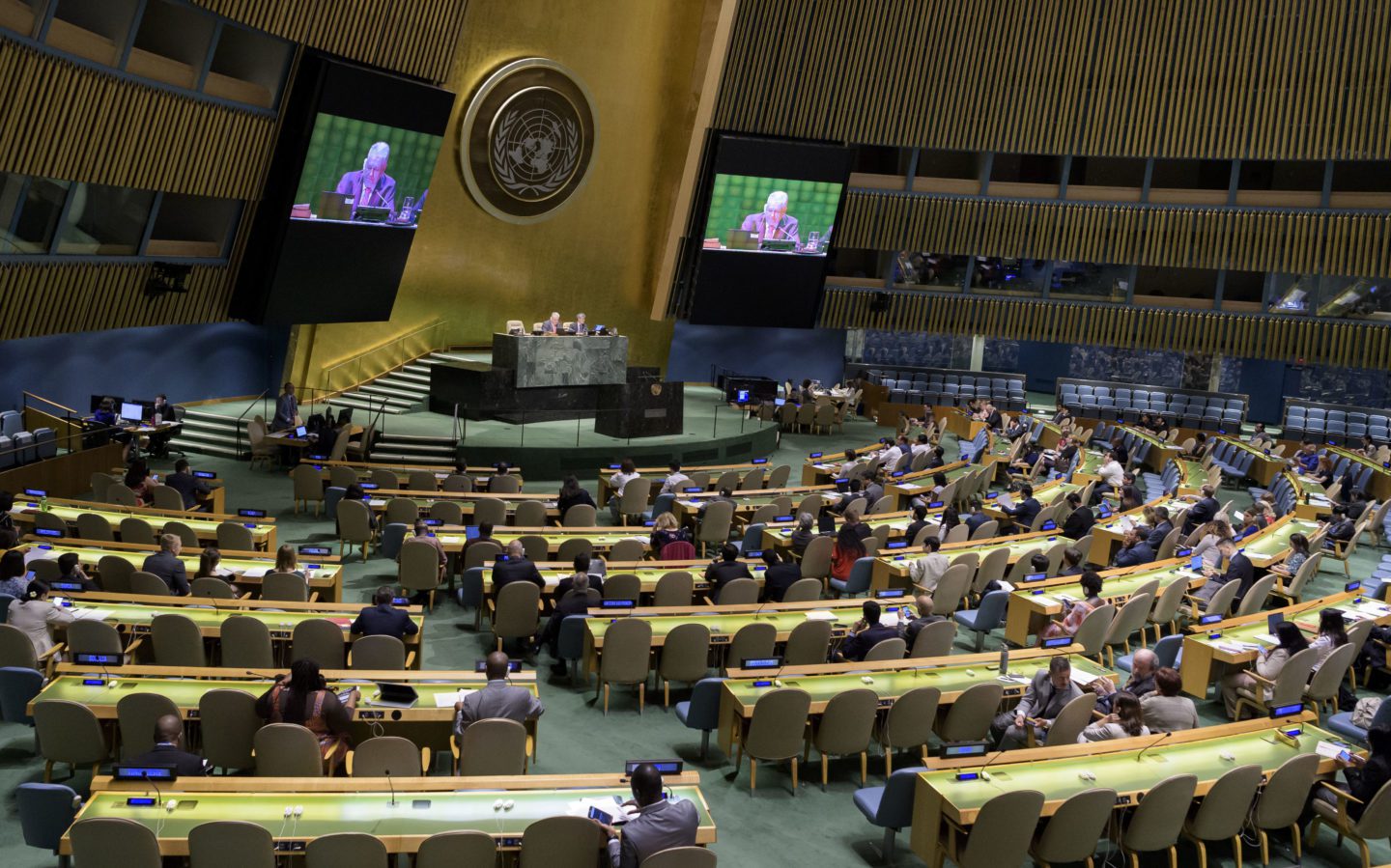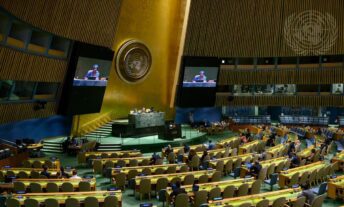
Meeting Summary: R2P and Human Rights: 7th Annual Ministerial Meeting on R2P
OVERVIEW
Coinciding with the opening of the 69th United Nations General Assembly, the governments of Ghana and the Netherlands, in association with the Global Centre for the Responsibility to Protect, co-hosted the 7th annual Ministerial Meeting on the Responsibility to Protect (R2P) on 25 September 2014. The aim of this year’s Ministerial Meeting was to discuss the linkages between R2P and human rights.
The meeting opened with statements from the two co-hosts: the Minister of Foreign Affairs of the Kingdom of the Netherlands, H.E. Mr. Frans Timmermans, and the Minister of Foreign Affairs and Regional Integration of the Republic of Ghana, H.E. Ms. Hanna Tetteh. Additional opening statements were delivered by the UN Deputy Secretary-General, Mr. Jan Eliasson, and the High Commissioner for Human Rights, H.E. Mr. Zeid al-Hussein, before the floor was opened to interactive discussion among the Ministers in attendance.
Ministers representing eight governments participated in the meeting while twenty additional governments from across the globe attended as observers. The UN Secretary-General’s Special Adviser on the Prevention of Genocide, Mr. Adama Dieng, and Special Adviser on the Responsibility to Protect, Dr. Jennifer Welsh, also participated in the meeting
KEY THEMES
Building national infrastructure and capacity to protect human rights
Participants acknowledged that as states have the primary responsibility to protect their populations, it is essential that national human rights mechanisms have adequate capacity for early warning and the prevention of mass atrocities. Several Foreign Ministers, including the ministers from Botswana and Ghana, highlighted how their countries are building institutions to protect citizens against infringement of their human rights as one means of upholding their responsibility to protect.
Minister Tetteh addressed the importance of linking early warning and early action by describing how Ghana’s National Peace Council has been instrumental in averting election-related religious and ethnic conflict. Minister Tetteh also discussed the challenges faced by governments that lack the institutional capacity to fulfill the protection responsibilities entrusted to them by their populations. Other participants echoed this concern, discussing the means through which outside actors can uphold their Pillar II responsibilities and assist in strengthening governments that are under stress. Within this context several participants called for international assistance in building inclusive national human rights institutions and asserted that support for such mechanisms should be a priority in the post-2015 development agenda.
Accountability for human rights violations
Since grave violations of human rights often serve as a warning sign, perpetrators must be swiftly held accountable to ensure that impunity does not result in the commission of mass atrocity crimes. Thus, accountability for human rights violations can serve an essential role in preventing mass atrocity crimes. As part of prevention, participants addressed the need to strengthen national commitments to international human rights law as well as national and regional judicial mechanisms for prosecuting perpetrators.
Accountability as part of post-atrocity reconciliation was also addressed, with participants emphasizing that all those who have faced atrocities must have a means to seek justice within an institution capable of responding to their grievances and prosecuting crimes, whether nationally, regionally or internationally. They also emphasized that there must be no amnesty for perpetrators of mass atrocity crimes, regardless of rank. This point was asserted by the Foreign Minister of Botswana who said that anyone with “the capacity to unleash their power and kill others” should not have special legal privileges despite holding high political office.
Upholding R2P through utilizing the resources of the Human Rights Council and Office of the High Commissioner for Human Right
While addressing the linkages between R2P and human rights, the discussion naturally turned to how the Human Rights Council and the Office of the High Commissioner for Human Rights (OHCHR) help in early warning, monitoring and ensuring accountability where atrocity crimes are being perpetrated or are at risk of occurring. Participants highlighted the value of peer review mechanisms, such as the Universal Periodic Review (UPR), and Human Rights Council briefings in raising awareness about serious human rights violations before they reach the level of mass atrocities.
Participants also discussed how to bolster the capacity of these institutions to serve populations facing mass atrocities. This includes expanding the presence of the OHCHR within countries to monitor ongoing human rights violations and assist governments in building the capacity to prevent such violations. The Deputy Secretary-General and High Commissioner also encouraged states to make better use of the recommendations identified in the UPR as well as in Commissions of Inquiry, while the Deputy Minister of Foreign Affairs of Slovenia suggested more frequent OHCHR briefings with the Security Council.
Mobilizing early response through the UN’s Rights Up Front Action Plan
Participants also focused on how the UN’s “Rights Up Front” Action Plan could facilitate early response ahead of mounting human rights violations. Several states, including Spain, discussed how Rights Up Front signals the UN’s commitment to “strengthening the inhibitors of conflict” by asserting that the protection of human rights is an upmost priority; when human rights are protected the risk factors of mass atrocities are greatly reduced.
The Foreign Ministers noted that Rights Up Front should generate greater political will to uphold the international community’s collective responsibility to respond to human rights violations, acknowledging that the action plan reinforces commitments to non-indifference and R2P. While several states noted with concern the reprehensible failure to act caused by some permanent members of the UN Security Council using the veto in mass atrocity situations, others remarked that Rights Up Front can be an essential tool in cases where inaction occurs even without the threat of the veto. High Commissioner Zeid noted that in Central African Republic, for example, we “very narrowly missed a genocide,” not because of an international response, but because populations fled. Even with ample information and no threat of veto, timely and urgent action was not taken by the Security Council. The High Commissioner then suggested that Rights Up Front can create a space in which there is no possibility of inaction.
CONCLUSION
Though the focus of this year’s Ministerial Meeting was the relationship between R2P and human rights, the meeting also expanded upon the assessment of Pillar II assistance to states discussed in the UN Secretary-General’s 2014 report on R2P, Fulfilling our collective responsibility: International assistance and the responsibility to Protect. Throughout the discussion, Foreign Ministers and UN officials highlighted the intrinsic value of external assistance for the prevention of mass atrocities and human rights violations through capacity building, monitoring and accountability assistance.
Participants at this year’s Ministerial Meeting noted with concern the grave violations of human rights and ongoing commission of mass atrocities that we continue to witness around the world today. As the Deputy Secretary-General said, “we are not losing ground conceptually on R2P, but we may be losing ground in the trouble spots we are seeing in the world.” Nevertheless, the discussion highlighted that “R2P is here to stay” and that with more effective early action we can make prevention of atrocities a global reality.
Related Content


Summary of the 2023 UN General Assembly Plenary Meeting on the Responsibility to Protect
